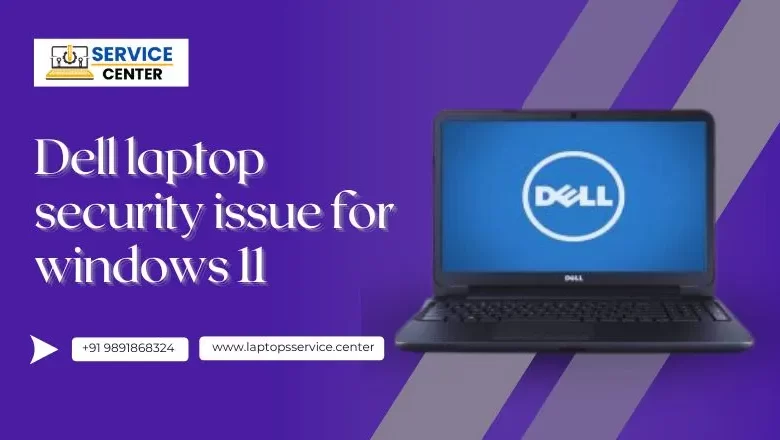Dell Laptop Security Issue for Windows 11

In today’s digital age, safeguarding your Dell laptop against potential threats is paramount, especially with the advent of Windows 11. As cyber threats evolve, so too must our defences. Understanding the unique security challenges posed by Windows 11 on Dell laptops is crucial for maintaining a safe computing environment.
Windows 11: New Features and Security Challenges
With the launch of Windows 11, Dell laptop users are introduced to many new features promising enhanced productivity and user experience. However, along with these advancements come potential security vulnerabilities that threat actors may exploit. From the redesigned interface to the improved gaming capabilities, each feature presents its security challenges that users must be vigilant against.
Common Dell Laptop Security Issues for Windows 11
Despite Dell’s reputation for quality hardware, Dell laptops running Windows 11 are not immune to security issues. Common concerns include malware infections, data breaches, phishing attacks, and unauthorized access. Vulnerabilities in the operating system or third-party software can expose Dell laptops to exploitation, highlighting the need for proactive security measures.
Vulnerabilities in Windows 11: Like any operating system, Windows 11 might harbour vulnerabilities that malicious entities could exploit, potentially compromising Dell laptops’ security or granting unauthorized access.
Lack of security updates: Failure to regularly update Windows 11 and Dell laptop firmware can expose systems to known security vulnerabilities, increasing the risk of exploitation.
Insecure configurations: Incorrectly configured security settings or firewall rules on Windows 11 may leave Dell laptops vulnerable to attacks, such as unauthorized access or data breaches.
Malware and ransomware attacks: Dell laptops running Windows 11 are susceptible to malware infections and ransomware attacks if users inadvertently download and execute malicious software or if the system lacks adequate security measures to detect and prevent such threats.
Phishing and social engineering attacks: Dell laptop users running Windows 11 may be targeted by phishing emails, fake websites, or social engineering tactics designed to trick them into divulging sensitive information or installing malware.
Weak authentication mechanisms: Inadequate passwords or authentication on Dell laptops with Windows 11 can jeopardize data security.
Hardware vulnerabilities: Vulnerabilities within Dell laptop hardware or firmware can be exploited, compromising security and granting unauthorized access.
Face Lock Vulnerabilities: While face lock technology offers convenient biometric authentication, it may be vulnerable. Poor lighting conditions or inaccurate facial recognition algorithms could lead to false positives or unauthorized access. Additionally, attackers may exploit weaknesses in facial recognition software to bypass security measures, highlighting the importance of implementing robust facial recognition systems and regularly updating them to address potential security flaws.
Fingerprint Detection Risks: Fingerprint detection on Dell laptops running Windows 11 provides a secure authentication method, but it is not without its risks. Spoofing attacks, where attackers attempt to replicate fingerprints to bypass security measures, pose a significant threat. Moreover, if the fingerprint sensor is not adequately protected or the stored fingerprint data is compromised, unauthorized access to the device could result. Therefore, it’s essential to employ encryption and other security measures to safeguard fingerprint data and ensure the integrity of the authentication process.
While face lock and fingerprint detection technologies enhance the security of Dell laptops running Windows 11, they also introduce potential vulnerabilities that must be addressed. By implementing robust security measures, regularly updating software, and educating users about best practices for biometric authentication, organizations can mitigate these risks and maintain the integrity of their laptop security.
Addressing these security issues requires implementing robust security measures, such as promptly installing security updates, using reputable antivirus software, practising good security hygiene, and educating users about potential threats and best practices for mitigating them.
Best Practices for Securing Your Dell Laptop on Windows 11
Securing your Dell laptop on Windows 11 requires a comprehensive approach that combines both technical solutions and user behaviors. Here are some best practices to ensure the safety and integrity of your device:
Keep Your System Updated: Regularly update your Dell laptop’s operating system, applications, and firmware to patch vulnerabilities and strengthen security measures. Windows 11 offers automatic updates, ensuring you have the latest security patches.
Enable BitLocker Encryption: Utilize BitLocker, a built-in encryption tool in Windows 11, to encrypt your laptop’s hard drive. This protects your data in case your laptop is lost or stolen, ensuring that unauthorized users cannot access sensitive information.
Use Strong Passwords: Set strong, unique passwords for your user account and any other accounts linked to your Dell laptop. Consider using a passphrase or password manager to create and store complex passwords securely.
Enable Secure Boot: Secure Boot is a feature that ensures only trusted software is loaded during the boot process, protecting against malware and other threats. Verify that Secure Boot is enabled in your laptop’s BIOS settings.
Install Antivirus Software: Install reputable antivirus software on your Dell laptop and keep it updated to detect and remove malware, viruses, and other malicious threats effectively.
Enable Firewall Protection: Windows 11 includes a built-in firewall that helps monitor and control incoming and outgoing network traffic. Ensure that the firewall is enabled to block unauthorized access to your laptop.
Be Cautious of Email and Web Links: Exercise caution when opening email attachments or clicking on web links, as they may contain phishing attempts or malware. Verify the sender’s identity and be wary of unexpected emails or suspicious websites.
Use Secure Wi-Fi Networks: Avoid connecting to unsecured Wi-Fi networks, especially when accessing sensitive information or performing online transactions. Use a virtual private network (VPN) when connecting to public Wi-Fi to encrypt your internet traffic.
Enable Two-Factor Authentication: Enable two-factor authentication (2FA) wherever possible to add an extra layer of security to your accounts. This requires a second form of verification, such as a code sent to your phone, in addition to your password.
Regularly Backup Your Data: Backup your important files and data regularly to an external storage device or cloud service. In the event of a security breach or system failure, having backups ensures that you can restore your data and minimize potential losses.
By implementing these best practices, you can significantly enhance the security of your Dell laptop running Windows 11, safeguarding your personal information and digital assets from various threats and vulnerabilities.
Importance of Regular Updates and Maintenance
Regular updates and maintenance are integral components of Dell laptop security on Windows 11. By staying up-to-date with the latest patches and security fixes, you can address known vulnerabilities and minimize the risk of exploitation. Set up automatic updates to keep your operating system and software current. Perform routine scans for malware and perform system optimizations to keep your Dell laptop running smoothly and securely.
Seeking Professional Assistance: Dell Support for Security Concerns
If you have security concerns or technical issues with your Dell laptop on Windows 11, don’t hesitate to seek professional assistance. Dell offers comprehensive support services tailored to address security challenges and ensure the optimal performance of your device. Whether it’s troubleshooting software issues, resolving hardware malfunctions, or providing expert guidance on security best practices, Dell Service Center team is here to help.
In conclusion, safeguarding your Dell laptop on Windows 11 requires diligence, proactive measures, and access to reliable support resources. Understanding the security landscape, implementing best practices, and staying vigilant can protect your device and data from potential threats. Remember, your security is in your hands – prioritize it accordingly.







